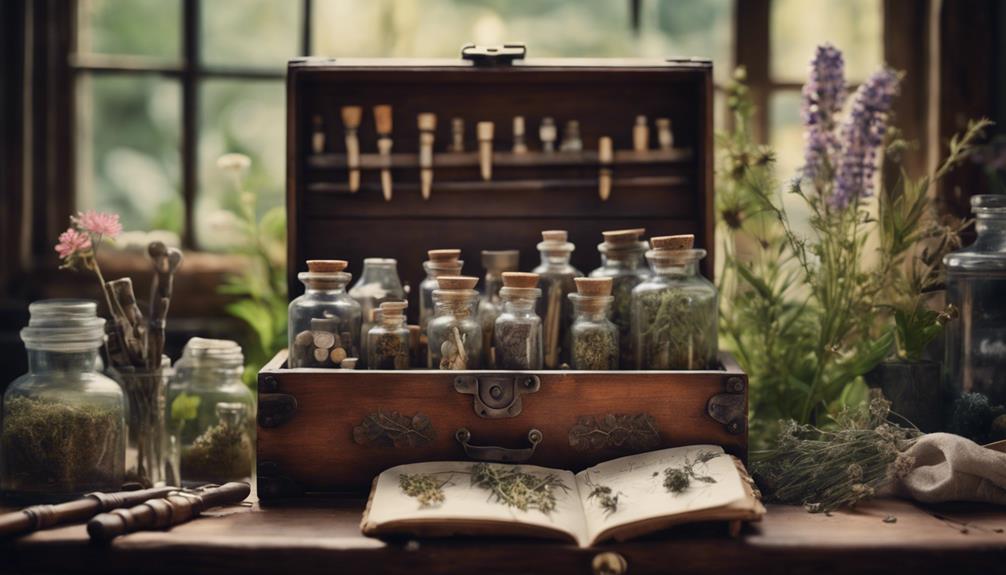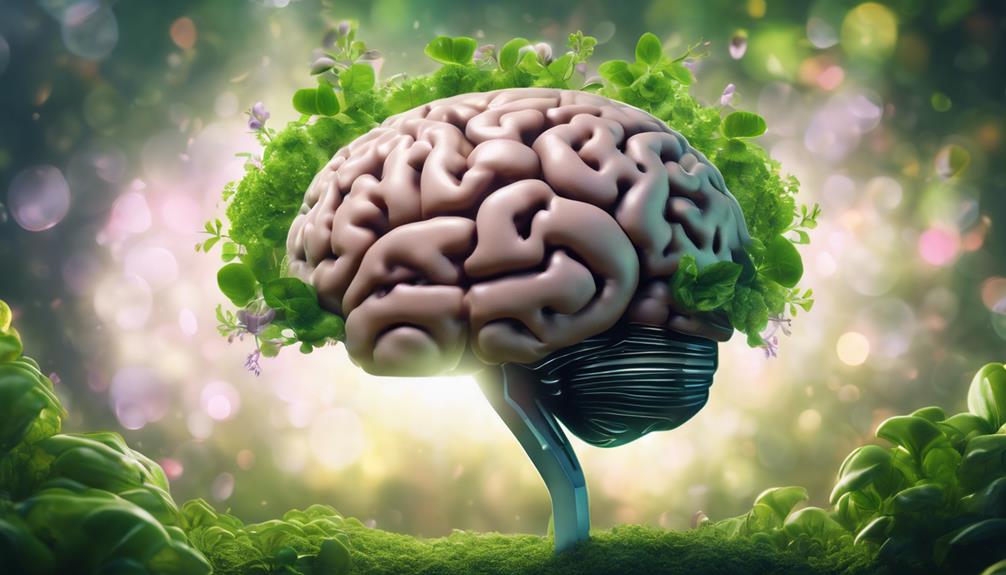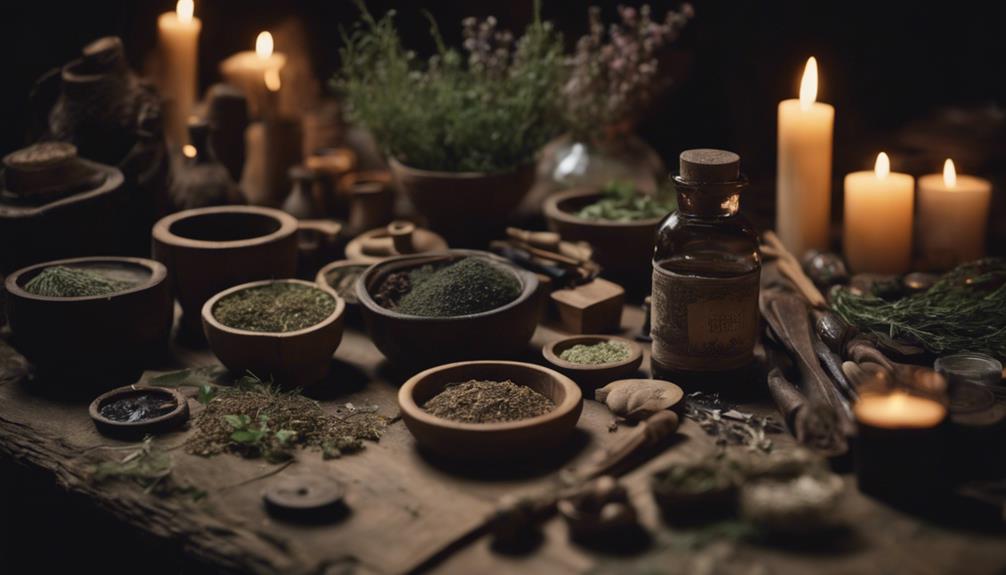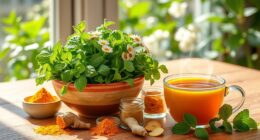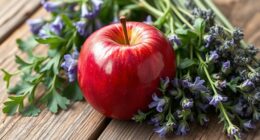As we explore the world of medical herbalism, we find a rich history of over 5,000 years of global significance in traditional medical systems. Herbal practices have been adapted with modern analysis for disease treatment, highlighting the therapeutic potential of plants. Phytochemical compounds interact with our body's systems, providing a scientific basis for herbal medicine. With a holistic approach to healthcare, medical herbalism integrates ancient wisdom with modern science. As we continue to uncover the complexities of herbal medicine, we'll discover more about its role in modern healthcare and its potential benefits for patient care.
Key Takeaways
• Herbalism has a global significance with a 5,000-year history, emphasizing a holistic approach to health in traditional medical systems.
• Phytochemical compounds in plants interact with the body's systems, providing a scientific basis for herbal medicine and its therapeutic potential.
• Herbal medicine works through interactions with receptors and enzymes, exhibiting antioxidant and anti-inflammatory properties to prevent and treat health issues.
• Consulting clinical herbalists and understanding pharmacological actions, bioavailability, and pharmacokinetics are crucial for optimizing herbal use and ensuring safety and efficacy.
• Integration of herbalism into healthcare promotes a holistic approach, with certified herbalists playing a significant role in promoting patient care and well-being.
Historical Roots of Herbalism
With a rich history spanning over 5,000 years, we've been turning to herbalism as a primary form of medicine globally, long before modern pharmaceuticals took center stage.
Our historical roots in herbalism have led to the development of traditional medical systems that emphasize a holistic approach to individual health. One notable example is traditional Chinese medicine, which has relied heavily on herbal remedies for over 3,000 years. These traditional practices have been adapted and integrated with modern analysis and quality control, allowing herbal medicine to gain recognition for treating and preventing diseases.
Across cultures, we've developed unique traditional medical systems that utilize herbal therapies, showcasing the global significance of herbalism in medicine.
As we delve into the world of medical herbalism, it's essential to acknowledge the historical roots that have shaped our understanding of this ancient practice. By exploring the historical context of herbalism, we can better appreciate its relevance in modern global medicine.
The Science Behind Herbal Medicine
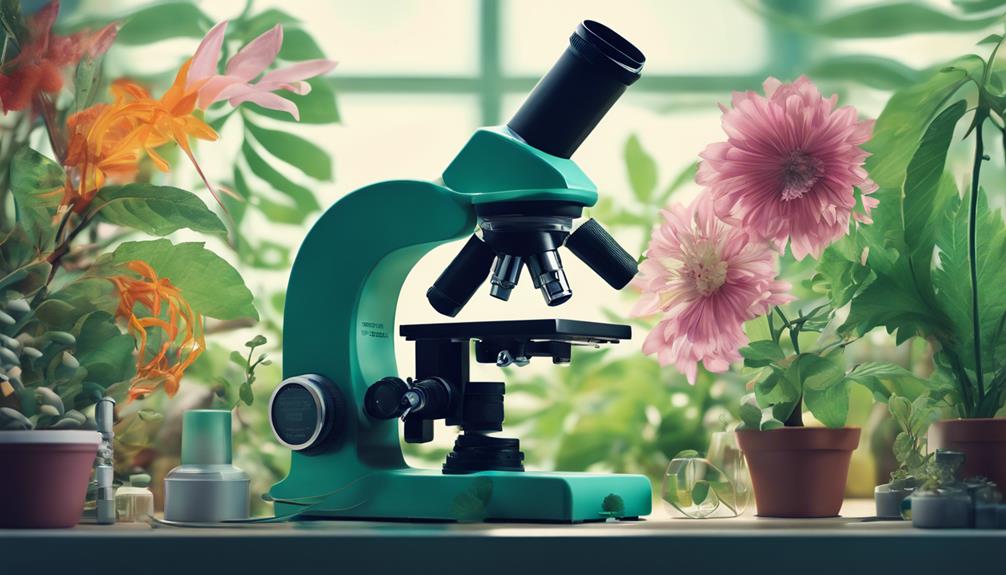
As we explore the science behind herbal medicine, we're going to examine the intricate details that make herbal remedies effective.
We'll start by looking at the phytochemical compounds found in plants, which are responsible for their medicinal properties. By understanding how these compounds work and their mechanisms of action, we can better appreciate the science that underlies herbal medicine.
Phytochemical Compounds Role
We've long been fascinated by the medicinal properties of plants, and it's the phytochemical compounds that are essential in revealing their therapeutic potential.
These active biochemicals in plants contribute to their medicinal properties, interacting with our body's systems and affecting various functions to promote health.
Understanding phytochemicals helps us identify the therapeutic actions of herbs and their potential benefits.
In medical herbalism, phytochemical compounds play an important role, providing a scientific basis for the use of plants as medicine.
The diverse range of phytochemicals in herbs includes antioxidants, anti-inflammatory agents, and other bioactive substances essential for health.
By recognizing the significance of phytochemical compounds, we can harness the power of plants to prevent and treat various health issues.
As we explore further into the world of herbal medicine, it becomes clear that phytochemical compounds are the key to unlocking the full potential of medicinal plants.
Mechanisms of Action
By examining the intricate mechanisms of action underlying herbal medicine, we can reveal the scientific basis for the therapeutic effects of phytochemical compounds. Herbal medicine works through various mechanisms of action, including interactions with receptors, enzymes, and signaling pathways in the body.
Phytochemicals in herbs can target specific biological processes, such as inflammation, oxidative stress, and immune response modulation. Herbal compounds may exhibit antioxidant, anti-inflammatory, antimicrobial, and neuroprotective properties, contributing to their therapeutic effects.
The bioavailability and pharmacokinetics of herbal constituents influence their efficacy and dosage requirements in the body. Understanding the pharmacological actions of herbs helps in optimizing their use for different health conditions and promoting overall well-being.
Safety and Efficacy of Herbs
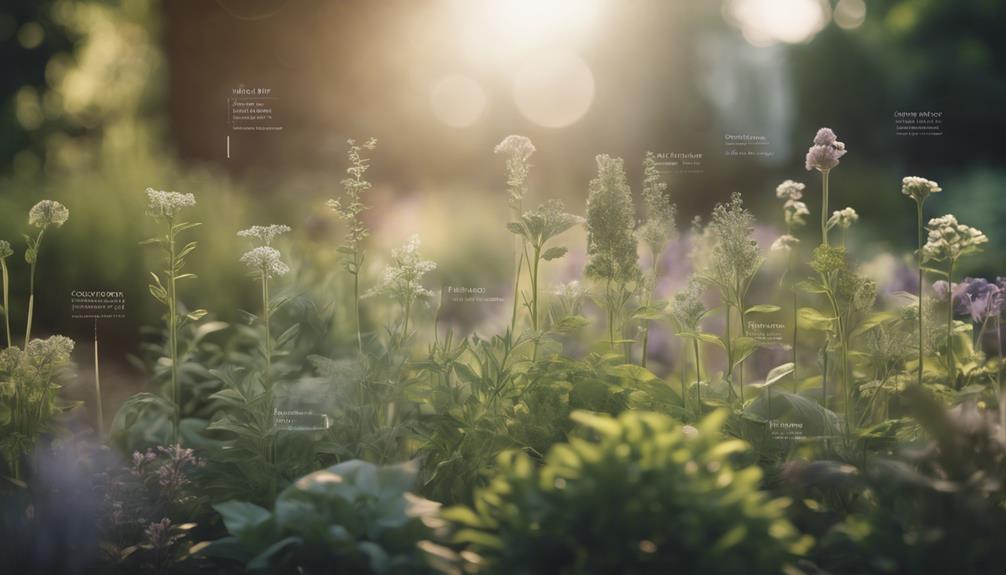
When utilizing herbal remedies, we must consider the dual factors of safety and efficacy, ensuring that the benefits of herbalism outweigh the potential risks.
Herbalism combines traditional uses with evidence-based research to determine the efficacy and safety of herbs. The effectiveness of herbal remedies can vary for each individual, highlighting the importance of consulting trained clinical herbalists for personalized recommendations.
Safety of herbs is influenced by factors like traditional use, individual sensitivity, dosage, and quality. We must take these factors into account to guarantee herbal safety.
Fortunately, free online resources like NLM's databases and subscription platforms such as ABC and AHPA offer accurate information on herbal safety. Additionally, regulation of the herbal industry involves classification as dietary supplements, enforcement by the FTC and FDA, and adherence to good manufacturing practices.
Regulations and Global Practices
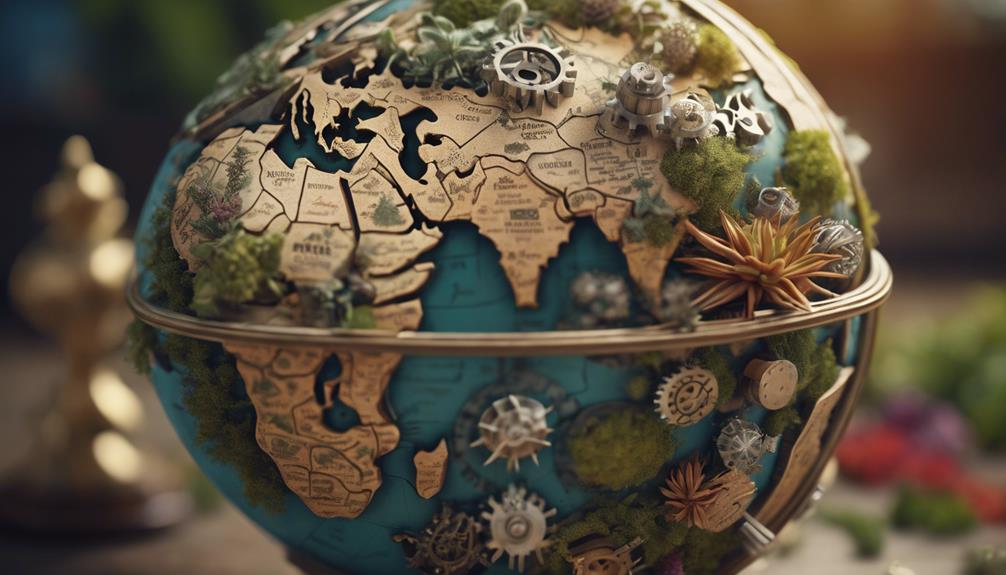
As we delve into the world of medical herbalism, we're reminded that regulations and global practices play an essential role in shaping the industry.
We'll examine the global regulatory frameworks that govern the production and distribution of herbal remedies, as well as the cultural traditions that have shaped the use of herbal medicine worldwide.
Global Regulatory Frameworks
We navigate a complex global regulatory landscape, where regulations in the US, Canada, and Europe govern the licensing, labeling, and monitoring of herbal remedies.
The World Health Organization recognizes the importance of traditional medicine, leading to significant investments in research. As a result, herbal medicine has become a significant global commercial enterprise, with the worldwide market for herbal products estimated at around US$60 billion annually.
Developing countries like Africa and China heavily rely on traditional medicine, with high usage rates. However, challenges persist, including standardization of herbal extracts, quality control, and environmental impact on biodiversity.
To address these concerns, regulatory frameworks focus on licensing, labeling, and monitoring of herbal products. Ensuring quality control measures are in place is vital, as it directly affects the safety and efficacy of herbal remedies.
As we move forward, it's crucial to strike a balance between promoting traditional medicine and maintaining rigorous standards for herbal products in the global market.
Cultural Herbal Traditions
We'll explore how cultural herbal traditions have shaped the global regulatory landscape, influencing the way herbal remedies are developed, marketed, and consumed across different regions. Traditional Chinese medicine, with a rich history spanning over 3000 years, heavily relies on herbal remedies. Similarly, developing countries like Africa and China have high rates of traditional medicine usage.
| Region | Traditional Medicine Usage |
|---|---|
| Africa | High |
| China | High |
| US, Canada, Europe | Governed by regulations |
The global market for herbal products is estimated at around US$60 billion annually. Regulations in the US, Canada, and Europe govern the licensing, labeling, and monitoring of herbal remedies. The World Health Organization (WHO) recognizes the importance of traditional medicine, prompting significant investments in research and regulation. This cultural herbalism has led to the development of various herbal traditions, shaping the global market for herbal products. As we navigate the complex landscape of cultural herbal traditions, we'll examine further into the regulations and global practices that influence the development and consumption of herbal remedies.
Integrating Herbalism Into Healthcare

Many healthcare providers are now incorporating herbal medicine into inclusive treatment plans, recognizing the potential benefits of a more holistic approach to patient care.
As we explore the integration of herbalism into healthcare, it's important to acknowledge the growing interest in medical herbalism. Herbalists, like those certified by the American Herbalists Guild (AHG) or American Association of Naturopathic Physicians (AANP), are playing a significant role in this shift.
In some European countries, herbs are even classified as drugs, and their use is regulated, with medical and pharmacy schools incorporating herbal medicine into their curricula.
As healthcare providers learn more about the positive and negative effects of herbal medicines, understanding drug-herb interactions becomes necessary for safe and effective treatment when using herbal medicines alongside prescribed drugs.
This integration isn't only about recognizing the herbal industry's potential but also about ensuring that qualified herbalists and healthcare providers work together to provide the best possible care. By doing so, we can harness the benefits of herbal preparations and create a more thorough approach to healthcare.
The Future of Medical Herbalism

As medical herbalism gains traction in mainstream healthcare, its future looks promising, with advancements in regulation, education, and research set to propel the industry forward.
We're seeing a shift towards recognizing herbalism as a valuable complement to traditional medicine, with providers incorporating it into thorough treatment plans.
In the future, we can expect increased regulation in some countries, more education in medical and pharmacy schools, and a growing understanding of herbal medicine's effects. Standardized herbal extracts and combinations are being researched for their potential benefits, and we're excited to see the results.
To guarantee safe and effective treatment, it's important to consult with experts and reputable manufacturers for quality herbal supplements and doses.
As we move forward, we're likely to see herbal medicine play a larger role in addressing a wide range of health conditions and supporting cognitive function. With continued research and advancements, we can expect medical herbalism to become an integral part of modern healthcare.
Frequently Asked Questions
What Is the Difference Between a Herbalist and a Medical Herbalist?
We often get asked what sets a herbalist apart from a medical herbalist.
Simply put, a herbalist focuses on traditional and cultural uses of herbs for health, while a medical herbalist has formal training in clinical herbal medicine.
Medical herbalists work closely with healthcare providers to integrate herbal remedies into treatment plans.
What Is the Most Powerful Healing Herb?
Let's cut to the chase – there's no single 'most powerful' healing herb, folks! It's like asking which superhero is the strongest (hello, subjective opinions!).
Turmeric's curcumin is amazing for inflammation, while echinacea's immune-boosting properties can't be beat. And don't even get us started on ginseng's adaptogenic awesomeness.
The truth is, the most powerful herb is the one that addresses our individual needs and conditions. So, let's ditch the 'best' debate and focus on finding the right herb for our unique health journeys.
Are Most Herbalists Trained as Doctors?
We need to clarify a common misconception: most herbalists aren't trained as medical doctors. While some may have backgrounds in holistic health practices, they typically undergo specialized training in herbal medicine and hold certifications or degrees from recognized programs.
What Is the Study of Medicinal Herbs?
What exactly is the study of medicinal herbs, anyway?
It's medical herbalism, which involves using plants for therapeutic purposes.
We're talking about understanding how different herbs interact with body systems to promote health and treat ailments.
It's not just about tossing some herbs in a pot; it's a holistic approach that considers physical, mental, and emotional aspects of health.
Conclusion
As we weave together the threads of history, science, and regulation, a rich tapestry of medical herbalism unfolds. Like a skilled apothecary, we've distilled the essence of this ancient practice, separating fact from fiction.
With a critical eye, we've examined the complexities of herbal medicine, illuminating its potential to harmonize with modern healthcare.
As the landscape of medical herbalism continues to evolve, we're poised at the threshold of a new era, where ancient wisdom and modern science converge.

